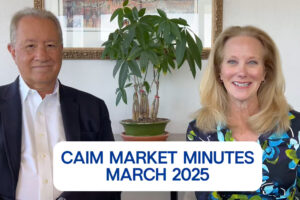 CAIM Market Update – 2nd Quarter
CAIM Market Update – 2nd Quarter
From a peak in early April the S&P 500 fell almost 10% by early June but has rebounded in recent weeks. Stocks have moved modestly lower this quarter and U.S. equities are now attractively valued following their April/May declines. For the 2nd quarter, the Dow had a loss of 1.9% and the S&P 500 2.8%. U.S. and global economic growth remains sluggish with multiple fluctuating factors making it difficult for the market to sustain a trend. Here are four crucial areas currently affecting the market.
Euro Zone
Against bearish predictions the late June EU meeting in Brussels led to a deal that gave the Euro Zone some breathing room. The deal has kicked the can down the road once again but given a much-needed boost of confidence to business owners and managers in America, and led to stock rises in the U.S. and Europe.
Impending “Fiscal Cliff”
The end of 2012 brings the U.S. government to a conundrum, popularly known as the “fiscal cliff.” At that time lawmakers have a choice; let current policy, involving tax increases and spending cuts, go into effect and possibly push the economy into outright recession during the first half of 2013. Or cancel some or all of the scheduled tax increases and spending cuts, and add to the deficit and increase the odds of the United States facing a crisis similar to Europe’s.
The highly partisan nature of the current political environment will make any compromise difficult to reach, which is of particular concern for investors.
Upcoming Elections
November’s upcoming Presidential Election overhangs everything. It’s results could leave the balance of power in Washington unchanged, or result in more power and control for the Republican Party. The latter could lead to changes and reversals in tax laws, healthcare reform and much more. No one can predict the fall out until it happens.
Emerging Markets
The emerging markets are going through a soft patch as they too feel the effects of Europe. China and India still enjoy relatively strong growth but both economics are slowing down from much higher rates of growth. Brazil in contrast has grown very little and industrial production has dropped.
The uneven economic performance in emerging markets means that investors are facing severe challenges involving slowing growth and dealing with severe declines in local currency against the dollar.
CAIM’S Perspective
While the equity markets have proven to be an uncomfortable ride for everyone this year, we take comfort in our strategy of investing in companies that can benefit investors in both up and down markets. There are 3 key advantages to investing in our high quality dividend strategy:
1. Valuation. The average company in our universe trades at a 20% discount to their 5-year average.
2. Yields. The average dividend yield for our stocks is 2.8% versus the 2-year treasury at .31% and the 10-year treasury note at 1.66%.
3. Quality. It is difficult to argue that there is a higher quality investment available when we see our average company has a debt to total equity ratio of 28% and $5.54 in cash flow per share.


 CAIM Market Update – 2nd Quarter
CAIM Market Update – 2nd Quarter



